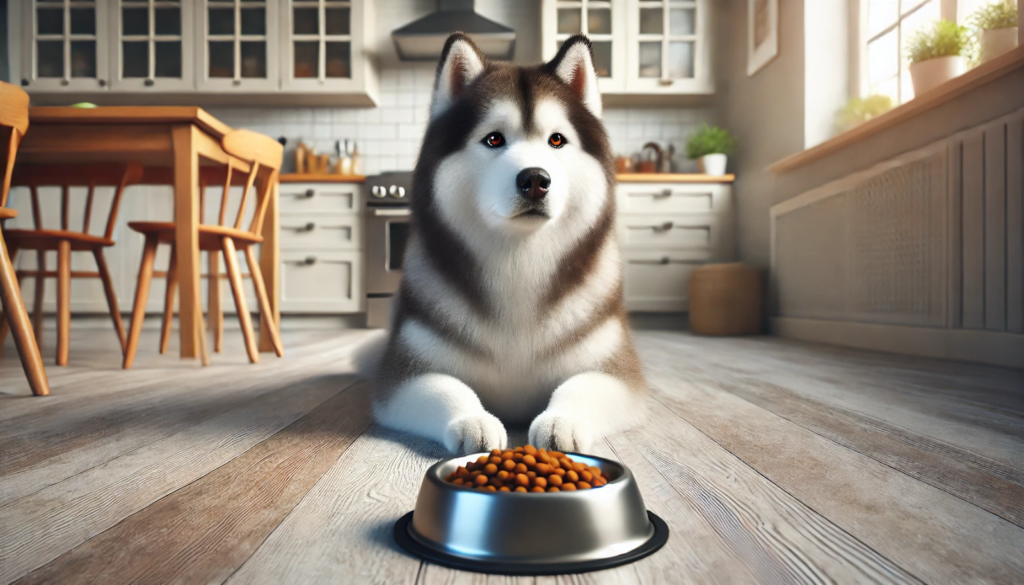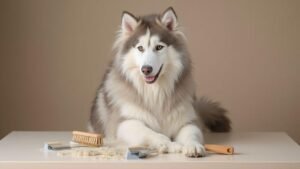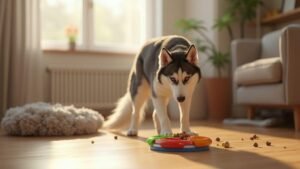Siberian Huskies are known for being lean, energetic, and sometimes… picky eaters. It can be concerning when your dog suddenly refuses food or begins eating less than usual — especially for a breed that already eats less than expected for its size.
But don’t panic. A Husky that isn’t eating may not always be sick. In many cases, it’s a matter of preference, routine, or environmental changes.
In this article, we’ll cover why your Husky might stop eating, when it’s normal, when it’s serious, and what you can do to encourage healthy eating habits.
Is It Normal for Huskies to Eat Less?
Yes. Huskies have:
- Efficient metabolisms (bred to work long hours on minimal food)
- Self-regulating appetites (they eat when they need to)
- Lean body types (naturally thin, with visible waistlines)
If your Husky skips a meal or two but is otherwise active and normal — it’s usually not an emergency.
Common Reasons Why a Husky May Not Eat
1. Hot Weather
Huskies often eat less when temperatures rise. Their thick coats make them more sensitive to heat, and appetite naturally drops during warm seasons.
What to do:
Offer food during cooler parts of the day (early morning or late evening) and ensure access to fresh water.
2. Too Many Treats
If your Husky is snacking throughout the day, they may not be hungry at mealtime.
Fix:
Cut back on treats or limit them to training sessions only.
3. Boredom with Food
Some Huskies get bored with the same food daily and may skip meals waiting for something more interesting.
Solution:
- Rotate between approved flavors or proteins
- Add small toppers (like bone broth, eggs, or cooked veggies)
- Slightly warm the food to enhance aroma
4. Feeding Too Much
Many owners overestimate how much food a Husky needs. If your dog’s bowl is consistently full, they may eat only what they need — and ignore the rest.
Tip:
Follow feeding guidelines based on weight and age. Stick to scheduled mealtimes and remove uneaten food after 20 minutes.
5. Stress or Routine Changes
Huskies are sensitive to their environment. A change in:
- Home
- Family members
- Travel
- New pets
…can impact appetite temporarily.
Offer calm reassurance, maintain routine, and monitor for improvement.
6. Dental Issues or Mouth Pain
Painful gums, broken teeth, or oral injuries can cause a dog to stop eating.
Signs to watch for:
- Drooling
- Pawing at mouth
- Favoring one side when chewing
- Refusing kibble but eating soft food
Consult your vet if you suspect a dental issue.
7. Underlying Illness
Sudden or prolonged appetite loss could signal a health problem, such as:
- Gastrointestinal upset
- Parasites
- Infections
- Organ issues
- Allergies
If your Husky shows other symptoms like vomiting, diarrhea, lethargy, or weight loss — contact a veterinarian immediately.
When to Worry About Loss of Appetite
| Duration | Concern Level | Action |
| Skips 1 meal | Low | Monitor behavior |
| Skips 2–3 meals | Medium | Offer alternative food, check hydration |
| Skips more than 24 hours | High | Call your vet, especially with symptoms like vomiting or lethargy |
Tips to Encourage Your Husky to Eat
1. Stick to a Feeding Schedule
Feed at the same times daily and remove the bowl after 15–20 minutes. Avoid leaving food out all day.
2. Make Food More Appealing
Try:
- Warming kibble slightly
- Adding low-sodium broth
- Mixing in a spoonful of wet food
- Sprinkling freeze-dried raw toppers
3. Switch Food Gradually
If changing brands or types, do it slowly over 7–10 days to avoid stomach upset.
4. Exercise Before Meals
A tired dog is a hungry dog. Go for a walk or play before offering food.
5. Reduce Distractions
Feed in a quiet space without noise, kids, or other pets around.
What Not to Do
- Don’t force-feed your dog
- Don’t switch foods constantly without reason
- Don’t ignore a Husky that refuses food for more than a day
If in doubt, consult a professional.
Final Thoughts: Trust Your Dog, But Stay Alert
Siberian Huskies are known for being particular eaters — and skipping the occasional meal isn’t always a sign of illness. But you know your dog best. If something feels off, or if appetite loss is paired with other symptoms, don’t hesitate to reach out to your vet.
With patience, routine, and the right approach, your Husky can maintain a healthy, consistent appetite — and stay full of energy and joy.






